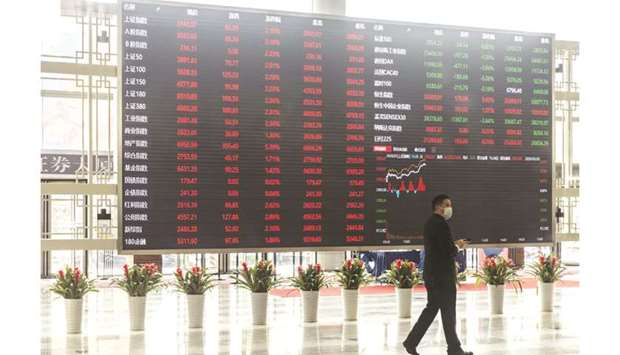The fresh surge in coronavirus cases across the United States and Europe weighed on stock markets yesterday, while investors have essentially given up on the chances of a new stimulus out of Washington.
With US lawmakers unlikely to agree any new rescue package before Tuesday’s election, analysts said the new wave of virus infections and lingering uncertainty over the vote mean equities will face a wobbly few days.
European leaders are being forced to revert to strict, economically damaging measures to control the spread of the virus as some record a spike in deaths and new cases.
And with the United States also suffering a Covid-19 resurgence, there is a fear that the already-stuttering global economic recovery will be thrown off track.
Some experts have warned of a double-dip recession.
“Covid case counts and hospitalisations continue to rise – these will continue to be closely watched as investors gauge the likelihood of more stringent mitigation measures,” said StoneX strategist Yousef Abbasi.
The impact of this year’s lockdowns and travel restrictions was laid bare Tuesday as the World Tourism Organisation said tourism had collapsed 70%, leading to a $730bn loss in revenues, while the UN’s trade body said foreign direct investment was likely to slump 40%.
The Dow and S&P 500 both fell again, though the Nasdaq edged up as traders bet tech firms will benefit from people being forced to stay home.
The retreat extended into Asia, though traders pared or reversed morning losses as the day wore on.
Tokyo, Hong Kong, Mumbai, Taipei, Singapore and Manila were in the red, but Shanghai, Seoul and Wellington rose.
Sydney was lifted as Australia’s second-biggest city Melbourne enjoyed its first day of being open again after a months-long lockdown.
London lost more than 1% at the open, while Paris and Frankfurt were down almost 2%.
Tai Hui at JP Morgan Asset Management said the surge in infections in the US and Europe had been expected in the northern hemisphere winter, adding it “should push investors to take a more defensive position for the time being.
In the very short term, the US elections would reinforce this conservative bias.”
However, no matter the outcome, the result of the vote “should provide the certainty that investors are constantly looking for”.
With challenger Joe Biden well ahead of Donald Trump in national and battleground polls, the broad consensus is for him to take the White House, while the Democrats could win both houses of Congress.
That would likely see an even bigger stimulus than the one being discussed on Capitol Hill, which is providing some support to investors, though there is a fear that the incumbent president will challenge any tight result, leading to possibly weeks of wrangling.
And OANDA’s Edward Moya added that a Democratic sweep could also come with disadvantages for markets.
“Wall Street is convinced a ‘blue wave’ will signal massive infrastructure spending but it will also be accompanied with higher taxes, tougher regulation, and eventual inflation that will force the Fed’s hand,” he said in a note.
There was some more upbeat news from pharma giant Pfizer, which said it was optimistic it could provide a vaccine this year.
Chief executive Albert Bourla said it could supply about 40mn doses in the United States if clinical testing proceeds as expected and it is approved.
And while the company still had not reached key benchmarks in assessing efficacy, he said: “We have reached the last mile here.”
Bourla added that the firm is expected to file for emergency use authorisation for its vaccine in the third week of November, roughly in line with earlier timetables.
In Tokyo, the Nikkei 225 closed down 0.3 % to 23,418.51 points; Hong Kong – Hang Seng ended down 0.3% to 24,708.80 points and Shanghai – Composite closed up 0.5% to 3,269.24 points yesterday.

A man wearing a protective mask walks past an electronic stock board at the Shanghai Stock Exchange. The Composite index closed up 0.5% to 3,269.24 points yesterday.
